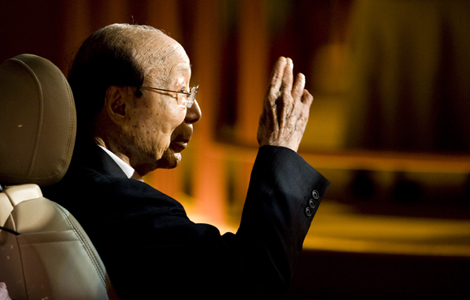China builds army 'with peace in mind'
Updated: 2014-01-14 02:01
By Zhao Shengnan and Mo Jingxi in Beijing and Chen Weihua in Washington (China Daily)
|
|||||||||||
Territorial rivalry
In November, China announced the creation of the East China Sea Air Defense Identification Zone, which requires aircraft to report their flight plans and establish identification communications while flying through the zone.
More than 20 countries, including the United States and Japan, have set up their own air defense identification zones since the 1950s.
The move by China has drawn criticism from the US and its ally Japan, given that the zone encompasses the Diaoyu Islands, which China has owned for centuries but which were "nationalized" by Tokyo in 2012.
Japan's illegal purchase triggered strong protests from China and prompted it to start regular patrols around the islands last year. In July, five PLA warships steamed out of the Sea of Japan, through the Soya Strait and completed the Chinese navy's first circumnavigation of the Japanese archipelago.
Cao Weidong, a researcher at the PLA Naval Military Studies Research Institute, said such activities would not increase tensions and that China's stance remains defensive, while its naval forces are still dwarfed by traditional maritime powers.
"Instead, Washington is shifting 60 percent of its warships to the Pacific and Tokyo is gearing up to build a fully fledged military. China is suffering from the threat of escalating conflict," he said.
James Holmes, a maritime strategist at the US Naval War College in Newport, Rhode Island, and a former US Navy surface warfare officer, said, "Naval commentators suggest the bellicose rhetoric shows that both sides are struggling to adjust to their new rivalry.
"And, the Japanese do regional tranquility no service by being alarmed when China's navy transits international straits in a perfectly lawful manner," Holmes told Reuters.
More mature
Su Hao, a professor of Asia-Pacific studies at China Foreign Affairs University, said China's more coordinated security policy and its willingness to interact with the rest of the world has contributed to a reduction in misunderstandings and the easing of tensions.
Su was speaking about Beijing's announcement of a State Security Committee in November, as well as increasing military drills between China and foreign militaries, "including both traditional partners and the so-called strategic competitors".
In November alone, China conducted joint military exercises with India, the US and Indonesia. The drill involving China and India was the pair's first in five years.
"The showcasing of the two sides' military strength helps to dispel Washington's concerns about China and to smooth relations," said Su.
The Chinese side, for example, properly handled a reported "near-miss" between warships of China and the US in the South China Sea in December, he said.
The US Pacific Fleet said a US guided-missile cruiser was forced to take evasive action to avoid a collision with a Chinese warship that was escorting China's aircraft carrier the Liaoning in the South China Sea on Dec 5.
The Chinese military later gave a toned-down response, stressing that the Chinese vessel was conducting "normal patrols", and said there were "good opportunities" for developing Sino-US military ties.
Chinese media reported that despite the incident, the PLA navy's East Sea Fleet is preparing to participate in the 2014 Rim of the Pacific naval exercise in Hawaii. It will be the first time China has joined the world's largest multinational maritime exercise, which is led by the US.
China has also boosted military diplomacy with regional neighbors, Su added, citing China's coordination with some Southeast Asian countries over their overlapping territorial claims in the South China Sea.
In 2013, Defense Minister Chang Wanquan visited a long list of countries, including the US, Canada, India, Indonesia and Brunei.
During the ASEAN Defense Ministers' Meeting Plus in August, Chang explained China's stance on the South China Sea issue.
Setting up a State Security Committee would also help the world to more easily grasp the country's security policies, with domestic problems like Taiwan and border stability topping its agenda, said Su.
But Robert Daly, director of the Kissinger Institute on China and the United States at the Wilson Center, said most foreign observers seem to be withholding judgment on the scope, functions and power of the State Security Committee, pending announcement of its membership.
Greater cooperation
Ma, the professor, highlighted the potential for greater military cooperation between China and other countries based on common threats like terrorism and piracy. A stronger Chinese military will be able to play a bigger role in serving global peace, he said.
Of the five permanent members of the UN Security Council, China is the largest contributor of personnel to UN peacekeeping missions.
In the past five years, China has sent 16 fleets composed of 42 warships to the Gulf of Aden and waters off Somalia, escorting 5,465 vessels and rescuing 42 ships attacked by pirates.
"It is normal for the world to have some suspicions about the Chinese military build-up, while mutual understanding can only be improved through communication."
Contact the writers at zhaoshengnan@chinadaily.com.cn
Related Stories
Chinese military lashes out at Japanese defense documents 2013-12-21 01:56
New joint command system 'on way' 2014-01-03 01:45
Military pledges to help develop China's west 2013-05-03 00:26
Flights over sea 'routine training' 2013-07-26 08:21
Chinese military training in W Pacific 'routine' 2013-09-09 15:48
PLA vows firm support for 'Chinese dream' 2013-03-18 13:30
Today's Top News
China pouring billions into London real estate
Beijing, Sofia vow new initiatives
Bangkok unrest hurts major projects
Army built 'with peace in mind'
UN plea made on war victims
Iran nuclear deal to take effect on Jan 20
Obama welcomes agreement on Iran nuclear deal
Unexpected sharp fall in tourism hits Beijing
Hot Topics
Lunar probe , China growth forecasts, Emission rules get tougher, China seen through 'colored lens', International board,
Editor's Picks

|

|

|

|

|

|





